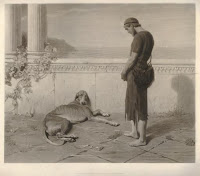I.
The girdle has a long, long history, reaching back into an ancient time that fashion historians term BP (Before Playtex).
Perhaps the most famous girdle of all was one said to have been worn by Aphrodite, the Greek goddess of love - although whether it was recognisably a girdle in the modern sense is debatable [2].
According to Homer, the girdle was imbued with the magical power to arouse desire in mortals and gods alike [3]. Thus, it can legitimately be regarded as an erotic accessory rather than merely a garment worn for practical reasons; Aphrodite, one assumes, didn't require any help maintaining her shape.
The same might not be true of Hera, who had a fuller, more matronly figure and sometimes borrowed the girdle from Aphrodite when looking for a little extra something in order to capture the attentions of her husband (and brother) Zeus [4].
II.
Interestingly, later authors claim that Aphrodite also lent her embroidered girdle to Helen, to ensure that Paris would succumb to her natural charms.
But Aphrodite was always keen to have the item returned to her as soon as possible, however, and the 18th-century German poet and playwright Schiller explains why that is so in his long philosophical essay On Grace and Dignity (1793) [5].
According to Schiller, Aphrodite - or Venus as he prefers to call her in the Roman manner - can be stripped naked and still remain beautiful; but without her girdle she lacks grace - and without grace she is no longer so alluring.
In other words, even a naturally beautful woman is desexualised the moment she is stripped naked; something that Roland Barthes picks up on in his essay on striptease in Mythologies.
Ultimately, it's the clothes and jewellery and make-up - "in short the whole spectrum of adornment" [6] that give the living flesh its erotic fascination and places the body within the realm of luxurious objects.
Notes
[1] The Museum of Fictional Literary Artifacts is an amusing digital project created by students at Dakota State University. The aim is to establish an online archive of imaginary objects that might - had they been actual things - have been sought after by collectors. The MFLA houses a vast number of such artifacts found in all genres of literary work, from novels to comic books. For more details, please click here.
[2] The Girdle of Aphrodite has variously been imagined as a strap, a belt, or a breast-band rather than a girdle as we might think of it today in a post-Playtex world of rubber. Whatever it was, Aphrodite's girdle has been a popular theme in the arts and literature of Europe, particularly during the Baroque and Neoclassical periods.
[3] See Homer, Iliad 14: 159-221. Homer. An English translation of the full text by A.T. Murray can be found on the Perseus Digital Library: click here to read Book 14.
[4] Theirs was not what you might call a happy marriage; she may have found him agreeable at first - just as he found her sexually attractive - but their relationship is marked by infidelity, jealousy, and violence.
[5] Über Anmut und Würde (1793) is an attempt to reconcile aesthetics and ethics based upon the philosophy of Immanuel Kant. For Schiller, the trick is to synthesise the physical and spiritual nature of man and thus produce a beautiful soul. An English translation of this essay by George Gregory can be read as a pdf online via the Schiller Institute website: click here.
[6] Roland Barthes, 'Sriptease', in Mythologies, trans. Annette Lavers, (The Noonday Press, 1991), p. 85.



